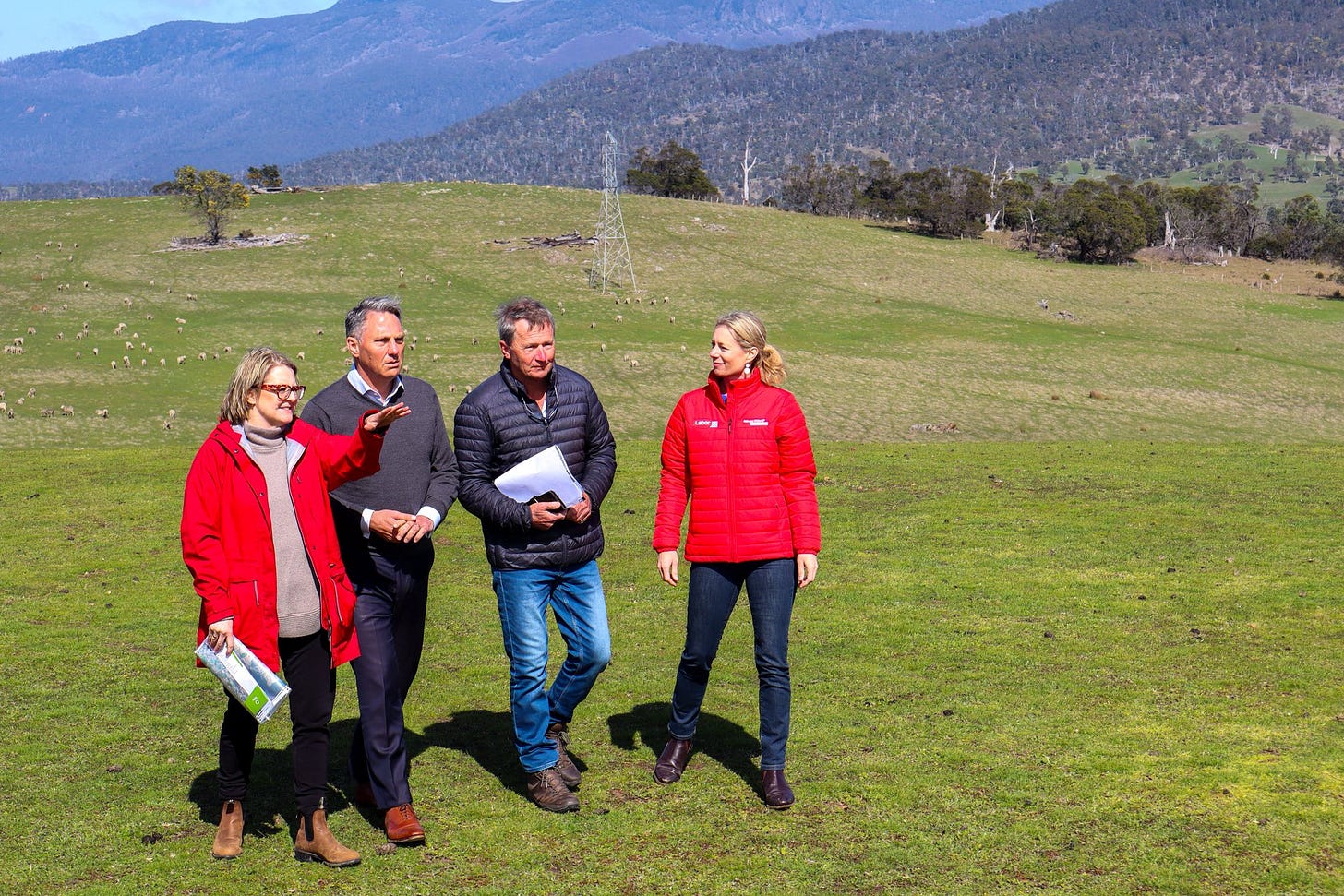Defence Minister Confirms TikTok Ban on Government Devices Amid Security Concerns
Today’s Article is brought to you by Empower your podcasting vision with a suite of creative solutions at your fingertips.
This piece is freely available to read. Become a paid subscriber today and help keep Mencari News financially afloat so that we can continue to pay our writers for their insight and expertise.
Defence Minister Richard Marles confirmed Wednesday he does not use TikTok on his government phone, citing security assessments that determine which applications are safe for official devices amid ongoing concerns about data handling by the Chinese-owned social media platform.
Marles told Sky News First Edition that the government conducts security evaluations for all apps used on government devices and platforms, with TikTok failing to meet the threshold for official use.
“I use a government phone, as you would expect, as the defence minister. I don’t have TikTok on it,” Marles said. “We will always do those assessments to work out where information goes, how it can be influenced and what apps in that context are safe for the government to operate.”
The comments come as Australia monitors developments in the United States, where authorities are moving to either ban TikTok or force its sale to American companies over national security concerns related to data access by the Chinese government.
Truth matters. Quality journalism costs.
Your subscription to Mencari directly funds the investigative reporting our democracy needs. For less than a coffee per week, you enable our journalists to uncover stories that powerful interests would rather keep hidden. There is no corporate influence involved. No compromises. Just honest journalism when we need it most.
Not ready to be paid subscribe, but appreciate the newsletter ? Grab us a beer or snag the exclusive ad spot at the top of next week's newsletter.
Government Assessment Process
Marles outlined the security evaluation framework the government employs when determining which applications can be installed on official devices.
“From a government point of view, in terms of government devices and platforms interacting with apps such as that, is we undertake a security assessment and we’ve made that assessment in relation to TikTok,” he said.
The minister declined to speculate on specific security threats posed by the platform but emphasized the government’s systematic approach to protecting sensitive information.
“We will always go through those processes to understand exactly where information ends up being handled and therefore what is safe for government devices to use,” Marles said.
The security assessment framework applies broadly to applications seeking approval for use on government networks and devices, with evaluators examining data flow, potential foreign government access and influence mechanisms.
Watching US Approach
Asked whether Australian tech companies acquiring TikTok’s local operations would address security concerns, similar to proposals under discussion in America, Marles said the government is monitoring the US situation.
“We’ll watch what America does in terms of walking down that path and we’ll see how that plays out,” he said.
The minister’s response suggests Australia may adjust its approach based on actions taken by Washington, reflecting the close intelligence and security partnership between the two nations.
The United States has moved toward requiring ByteDance, TikTok’s Chinese parent company, to divest its American operations or face a complete ban. American officials cite concerns that user data could be accessed by Beijing under Chinese national security laws requiring companies to cooperate with intelligence agencies.
Private Sector Operations
Despite the ban on government devices, Marles emphasized that TikTok continues to operate without restriction in Australia’s private sector.
“Of course, TikTok operates within the private economy completely freely and Australians operate on TikTok every day,” he said.
The distinction between government and private sector use reflects the government’s assessment that while the platform poses risks to sensitive official information, it does not warrant broader restrictions on civilian use.
Millions of Australians use TikTok daily for entertainment, business promotion and content creation, making it one of the country’s most popular social media platforms, particularly among younger demographics.
Government Device Restrictions
The TikTok ban on government devices was implemented across federal agencies following security advice from intelligence and cybersecurity agencies. The restriction extends to all devices used by ministers, public servants and contractors working with sensitive government information.
The policy aligns Australia with similar measures adopted by key allies including the United States, United Kingdom, Canada and New Zealand, all members of the Five Eyes intelligence-sharing network.
Government employees are prohibited from downloading TikTok on work phones and tablets, with existing installations required to be removed. The ban covers devices that access classified networks as well as those used for routine government business.
Personal devices owned by government employees remain outside the scope of the restriction, though security agencies have issued guidance about potential risks associated with installing certain applications on any device used to access government systems.
Australia’s approach to TikTok security mirrors actions taken by multiple Western democracies concerned about data access by authoritarian governments. The European Union has banned the application from devices used by its institutions, while several European national governments have implemented similar restrictions.
The security concerns center on Chinese laws compelling companies to cooperate with intelligence agencies and provide access to data upon request. Critics argue these legal requirements create risks regardless of where TikTok’s servers are located or how the company structures its data handling.
TikTok has repeatedly stated it does not share data with the Chinese government and would refuse any such requests. The company has invested heavily in data security measures, including routing Australian user data through servers in the United States and Singapore.
Data Sovereignty Questions
The minister’s comments about watching the American approach highlight ongoing questions about data sovereignty and whether local ownership would adequately address security concerns.
Under proposed US legislation, American ownership of TikTok operations would theoretically prevent Chinese government access to user data and algorithmic control. However, experts debate whether such arrangements can effectively sever connections to parent company infrastructure and personnel.
Australia has not publicly explored forcing a sale of TikTok’s local operations, instead maintaining the current approach of banning the application from government devices while allowing unrestricted private sector use.
The government’s position reflects a balance between security concerns and avoiding overreach into the private sector, particularly given the platform’s popularity and economic significance for content creators and businesses using it for marketing.
Security Agency Advice
The restriction on government devices followed advice from the Australian Signals Directorate and other security agencies responsible for protecting government networks and sensitive information.
Those agencies regularly assess applications and platforms for potential security risks, examining factors including data collection practices, server locations, ownership structures and potential vectors for foreign intelligence access or influence operations.
The assessment process considers not only direct data access risks but also potential for manipulation of algorithms to influence content delivery, spread misinformation or conduct surveillance of government personnel.
Security agencies have not publicly detailed specific vulnerabilities identified in TikTok’s operations, citing the sensitive nature of intelligence assessments. The classification of such information prevents public scrutiny of the reasoning behind the government device ban.
Platform Response
TikTok has challenged characterizations of its platform as a security threat, arguing that Australian user data is protected by robust security measures and stored outside Chinese jurisdiction.
The company has offered to implement additional transparency measures, including allowing authorities to inspect its code and data handling practices. Similar proposals have been made to American and European regulators facing comparable concerns.
TikTok executives argue that banning the platform from government devices while citing unspecified security concerns creates unjustified reputational damage and discriminates against the company based on its Chinese ownership rather than actual security practices.
The platform has pointed to its significant investments in local content moderation, partnerships with Australian creators and businesses, and economic contributions to the digital economy as evidence of its commitment to operating responsibly in the Australian market.
Broader Digital Security Policy
The TikTok restrictions form part of broader government efforts to secure digital infrastructure and protect sensitive information from foreign intelligence gathering and cyber threats.
Australia has implemented multiple measures aimed at securing telecommunications networks, including controversial decisions to ban Chinese technology companies from participating in 5G network infrastructure rollouts.
The government has also strengthened cybersecurity requirements for critical infrastructure operators and increased funding for agencies responsible for protecting government networks from sophisticated state-sponsored threats.
These measures reflect growing concern about digital espionage and influence operations conducted by authoritarian governments using technology platforms, telecommunications infrastructure and cyberattack capabilities.
Policy Evolution
Marles’ comments suggest the government’s TikTok policy may evolve based on international developments, particularly actions taken by the United States.
Any US-brokered deal requiring ByteDance to divest American operations could provide a model for other countries, including Australia, to consider similar arrangements. Alternatively, a complete US ban might prompt other nations to adopt more restrictive approaches.
The minister’s wait-and-see stance indicates Australia will not unilaterally impose restrictions beyond the current government device ban without observing outcomes of the US approach and assessing implications for Australian security and commercial interests.
For now, the status quo remains: TikTok is banned from government devices based on security assessments while operating freely in the private sector, where millions of Australians continue using the platform daily for entertainment, business and social connection.
The ongoing debate over TikTok security reflects broader challenges democracies face in managing risks posed by technology platforms owned or influenced by authoritarian governments while respecting free markets and avoiding unnecessary restrictions on popular services.
Sustaining Mencari Requires Your Support
Independent journalism costs money. Help us continue delivering in-depth investigations and unfiltered commentary on the world's real stories. Your financial contribution enables thorough investigative work and thoughtful analysis, all supported by a dedicated community committed to accuracy and transparency.
Subscribe today to unlock our full archive of investigative reporting and fearless analysis. Subscribing to independent media outlets represents more than just information consumption—it embodies a commitment to factual reporting.
As well as knowing you’re keeping Mencari (Australia) alive, you’ll also get:
Get breaking news AS IT HAPPENS - Gain instant access to our real-time coverage and analysis when major stories break, keeping you ahead of the curve
Unlock our COMPLETE content library - Enjoy unlimited access to every newsletter, podcast episode, and exclusive archive—all seamlessly available in your favorite podcast apps.
Join the conversation that matters - Be part of our vibrant community with full commenting privileges on all content, directly supporting The Evening Post (Australia)
Catch up on some of Mencari’s recent stories:
It only takes a minute to help us investigate fearlessly and expose lies and wrongdoing to hold power accountable. Thanks!








